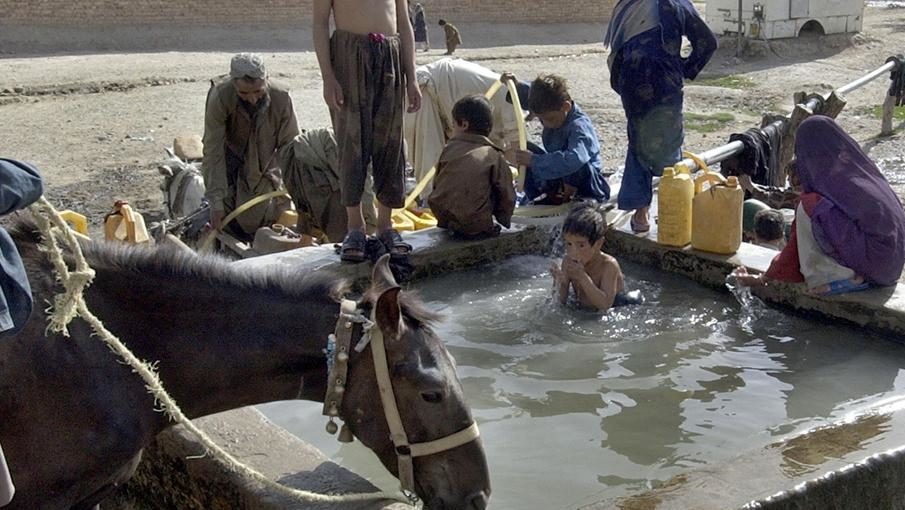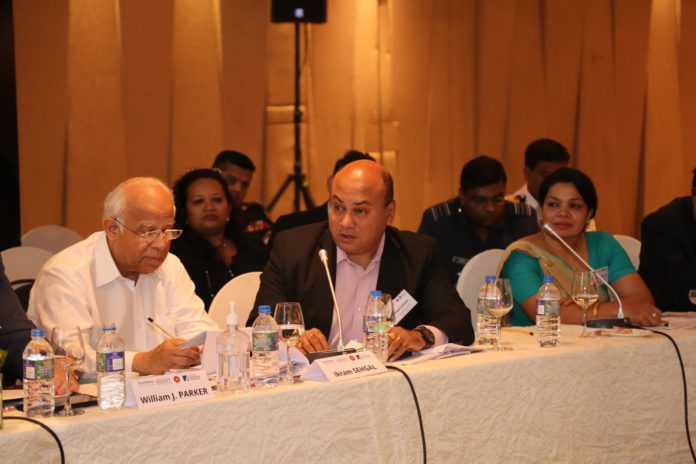The East West Institute (EWI) along with Konrad Adenauer Stiftung conducted an extremely successful two day panel discussion in Colombo, Sri Lanka on the water crisis titled “Water Security and Disaster Management in Asia”. The EWI is a conflict resolution organization with headquarters in New York. The participants discussed strategy, progress and possible solutions for the future especially in terms of the Himalayas (known as the Asian Water Tower) and water security as well as a climate change models that can be adapted by governments within the region. In light of the current climate change events the top security experts have foreseen a future water crisis that may result in a possible military conflict. Panelists from eight different countries and delegates from Pakistan, Nepal, India, Bangladesh, Sri Lanka, Germany and the Maldives were present. CEO and President of the EWI William J. Parker III presided over the conference. His team was absolutely brilliant, well prepared with their briefs as well as receiving the guest speakers and the different delegations.
As climate change transcends and now becomes a main topic of concern on top of local as well as global agendas, hydro politics or trans boundary water resource politics takes center stage across Eurasia. Climate change has affected nations across borders and has now accelerated their readiness to speak on the topic of water; the essence of all life on earth. Water challenges have never been more apparent as the impact of climate change has rapidly decreased available water resources and evaporated much of the water on earth and it is felt, that soon that it will lead to tensions throughout the entire world. It has been identified that as close to two billion people are already living in water stressed regions. The climate change effects and the eventual water crisis would eventually affect over billions of people and several countries which are sharing the resources.
A cooperative dialogue is the next step towards saving humanity from imminent discourse before water scarcity becomes a source of dispute and carnage. As nations race towards supplementing and adjusting their own resources they will likely be affecting their neighbors as well in the race to safeguard themselves. As one of the key note speakers outlined we have the technology of reverse osmosis and desalination systems, yet we need to implement them and of course, one could not stress enough on dialogue which would hopefully in turn result in solutions incorporated by good governance.

Water crisis will certainly affect food and re-usable water especially in countries such as Pakistan. Pakistan is a population of approximately 200 million people of which 47.79 % of the economy is configured as agricultural land. Water from the north is constantly threatened by Indian politics and their government, repetitively threatening to cut off the water flow into Pakistan. Belted in the north by the Himalayan range the main sources of water are situated where the glacier melt flows down towards tributaries and the rivers.
One interesting note by a Pakistani speaker was that water takes the shape of the vessel you put it into; similarly so would the fluidity and adaptability to water as a topic should be treated as thus. For the environmentalists, economists, climate specialists, governments, NGOs and so forth, water would be differently approached and therefore, all the stakeholders be there and present as the entire body would outline what needs to happen for the future. As Pakistan joins the race towards a sustainable future with the UN agenda and the SDGs, water has become a primary discussion even in local culture. Environmental concerns have had us establish a Ministry of Climate Change which is already working on climate change solutions as well as disaster management and there has also been a movement towards climate smart agriculture within the country.
Although part of the theme was clearly outlined by the forum as water security several speakers chose to argue that it was not pertinent to over securitize the problem and then which would turn in politicize it. However, with constant threats in over 200 news video clips in which the state of India threatens to the cut off water supplies to Pakistan, the question is how should one perceive this if not as an imminent political or even military conflict in the future?
Another note to be considered was that the relevant stakeholders should be present in this discussion. China, which is also very much part of the Himalayan glacier melt as a beneficiary, and Tibet is the source of all major water flows in Asia (for e.g. Mekong river). This important country was markedly absent from this dialogue. One delegate was present from an NGO in HK working in China however, they were not, as they quoted, an official representative of China itself. A more varied and greater body of representation could be possible to further the perspective. China is a huge stakeholder now in terms of any future diplomacy programs especially for BRI which deals significantly with geographical water routes of Asia and beyond.
The well-known saying ‘think globally act locally’, in the discussion, was altered to suit the forum, as part of one of the solutions proposed, to be ‘Think regionally. Act locally’. This solution outlined a multi-pronged approach to cover all major basins in the region as well as each country as an individual unit. Although we are faced with a global problem, the region itself is unique in differing as far as topography, geography, history, and culture which affects food and clean usable water and therefore solutions would be catered to suit each country’s DNA. The idea was to create national forums on water with the right type of experts for each, and then one on an international level which would connect the countries through governments. A decided unity in thinking was the viewpoint to be taken up on an International level. Another thing that stood as universally agreed upon as a point across the board, was that a multidisciplinary approach was needed and that without the knowledge of science, solutions would not be possible.
Although the delegates were certainly well prepared, some of them were repetitive with philosophical approaches which were not giving transparent solutions. They presented minimal papers on personalized scales speaking in silos about their regions and imparted local news rather than a joint regional solution. Perhaps a more solution-oriented agenda if given out beforehand would be helpful with specific guidelines on the topic to be presented so as to keep deliberations more compact for the next round.
An important area on threat perception was missed by some speakers that water security as a possible conflict has already been identified, so to acknowledge it would have been pertinent given the topic presented to them.
On a good note, the greater outcome of this was that the first of these meetings on this topic kicked off with great success and some interesting dialogue (and debate) did arise. A suggestion did come out that a database or portal of activity can certainly be formed with different research being input and shared by the countries. However, even on that one must ask the question, are the stakeholders willing to share information across borders with mutual trust and sincerity working towards a sustainable future.
The natural question in terms of Pakistan is this, what are our perceived threats and what is the reality of the issues on ground? For the sake of greater human interest, perhaps a regional unity in thought and acceptance of hydro politics can be hoped for with a long term plan formed in the near future by the stakeholder countries, keeping in mind water diplomacy and peace keeping efforts throughout Asia.




